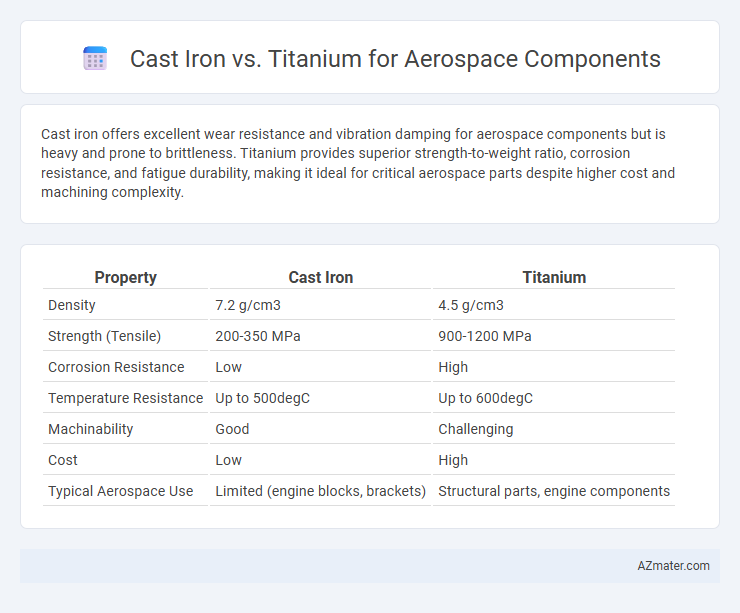Cast iron offers excellent wear resistance and vibration damping for aerospace components but is heavy and prone to brittleness. Titanium provides superior strength-to-weight ratio, corrosion resistance, and fatigue durability, making it ideal for critical aerospace parts despite higher cost and machining complexity.
Table of Comparison
| Property | Cast Iron | Titanium |
|---|---|---|
| Density | 7.2 g/cm3 | 4.5 g/cm3 |
| Strength (Tensile) | 200-350 MPa | 900-1200 MPa |
| Corrosion Resistance | Low | High |
| Temperature Resistance | Up to 500degC | Up to 600degC |
| Machinability | Good | Challenging |
| Cost | Low | High |
| Typical Aerospace Use | Limited (engine blocks, brackets) | Structural parts, engine components |
Overview of Materials: Cast Iron and Titanium
Cast iron, known for its high compressive strength and excellent wear resistance, is primarily used in aerospace components requiring rigidity and vibration damping, though its relatively high density limits its application in weight-sensitive parts. Titanium offers superior strength-to-weight ratio, exceptional corrosion resistance, and thermal stability, making it ideal for critical aerospace components subjected to high stress and extreme environments. The choice between cast iron and titanium hinges on balancing structural requirements, weight limitations, and operational conditions inherent to aerospace engineering.
Key Material Properties for Aerospace Applications
Cast iron offers excellent compressive strength and wear resistance but suffers from high density and limited tensile strength, making it less suitable for weight-sensitive aerospace components. Titanium exhibits a superior strength-to-weight ratio, exceptional corrosion resistance, and high fatigue strength, essential for critical aerospace applications requiring durability and performance under extreme conditions. The choice between cast iron and titanium depends heavily on specific component requirements such as weight constraints, thermal stability, and mechanical loads.
Strength-to-Weight Ratio Comparison
Titanium alloys exhibit a superior strength-to-weight ratio compared to cast iron, making them the preferred material for aerospace components where weight reduction is critical. Titanium's tensile strength ranges from 430 to 1,400 MPa with a density of about 4.5 g/cm3, while cast iron shows tensile strengths around 200 to 400 MPa but a much higher density of approximately 7.2 g/cm3. This significant disparity in density combined with higher strength allows titanium to provide enhanced performance and fuel efficiency in aerospace applications.
Corrosion Resistance in Aerospace Environments
Titanium exhibits superior corrosion resistance compared to cast iron in aerospace environments due to its stable oxide layer that resists oxidation and chemical attacks from moisture and salt. Cast iron is prone to rust and degradation when exposed to high humidity and saline conditions typical in aerospace applications. The enhanced corrosion resistance of titanium significantly extends component lifespan and reduces maintenance costs in aerospace structures.
Machinability and Fabrication Ease
Cast iron exhibits limited machinability due to its brittleness and high carbon content, often resulting in tool wear and surface finish challenges in aerospace component fabrication. Titanium, while more difficult to machine because of its low thermal conductivity and work-hardening characteristics, offers superior strength-to-weight ratio and corrosion resistance, which justifies specialized tooling and controlled machining parameters. Fabrication ease favors titanium in aerospace applications through advanced milling and turning techniques, enabling complex, lightweight parts critical for performance despite higher production costs compared to cast iron components.
Fatigue Resistance and Durability
Titanium outperforms cast iron in aerospace applications due to its superior fatigue resistance and durability, essential for high-stress environments. Titanium alloys exhibit exceptional strength-to-weight ratios and excellent corrosion resistance, significantly enhancing component lifespan under cyclic loading. Cast iron, despite its high compressive strength, is prone to brittleness and fatigue crack initiation, making it less suitable for critical aerospace parts.
Cost Analysis: Cast Iron vs. Titanium
Cast iron offers a significantly lower material cost compared to titanium, making it a budget-friendly option for aerospace components, especially in non-critical applications. Titanium's high cost is attributed to its complex extraction and processing methods, but it delivers superior strength-to-weight ratio and corrosion resistance, justifying the investment in high-performance parts. Cost analysis must balance initial material expenses with long-term benefits such as durability, weight savings, and maintenance reduction in aerospace engineering.
Temperature Resistance and Thermal Stability
Titanium exhibits superior temperature resistance and thermal stability compared to cast iron, maintaining strength and structural integrity at temperatures up to 600degC, while cast iron typically withstands up to 400degC before experiencing degradation. Titanium's low thermal expansion coefficient reduces thermal stress, making it ideal for aerospace components subjected to extreme temperature fluctuations. Cast iron's higher density and brittleness limit its application where lightweight and thermal resilience are critical.
Case Studies: Real-World Aerospace Components
Case studies highlight titanium's superior strength-to-weight ratio and corrosion resistance in aerospace components such as jet engine blades and airframe structures, leading to enhanced performance and fuel efficiency. Cast iron, while less common, is utilized in non-critical aerospace parts where its excellent damping properties and cost-effectiveness are beneficial, exemplified in some landing gear components and engine mounts. Titanium's widespread adoption in real-world aerospace applications is driven by its ability to withstand extreme temperatures and repeated stress without significant wear.
Selecting the Optimal Material for Aerospace Needs
Titanium alloys outperform cast iron in aerospace applications due to their superior strength-to-weight ratio, corrosion resistance, and fatigue performance, making them ideal for critical components like airframes and engine parts. Cast iron's high density and brittleness limit its use in aerospace, where weight savings and durability under extreme conditions are paramount. Selecting titanium reduces overall aircraft weight, enhances fuel efficiency, and improves structural integrity, meeting stringent aerospace industry standards.

Infographic: Cast iron vs Titanium for Aerospace Component
 azmater.com
azmater.com